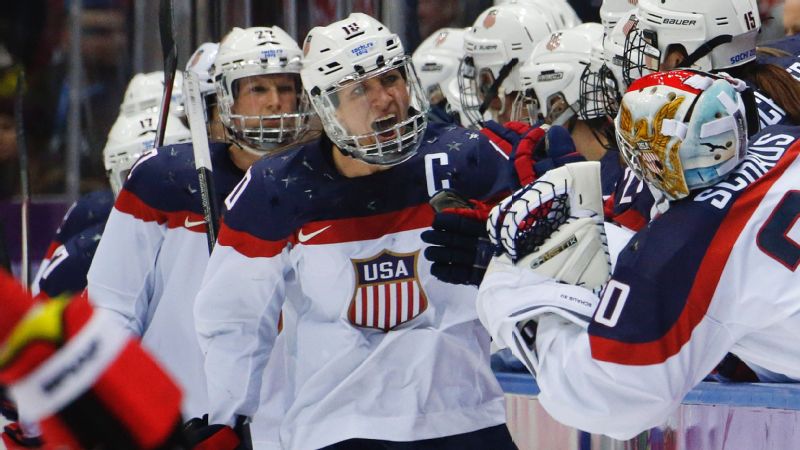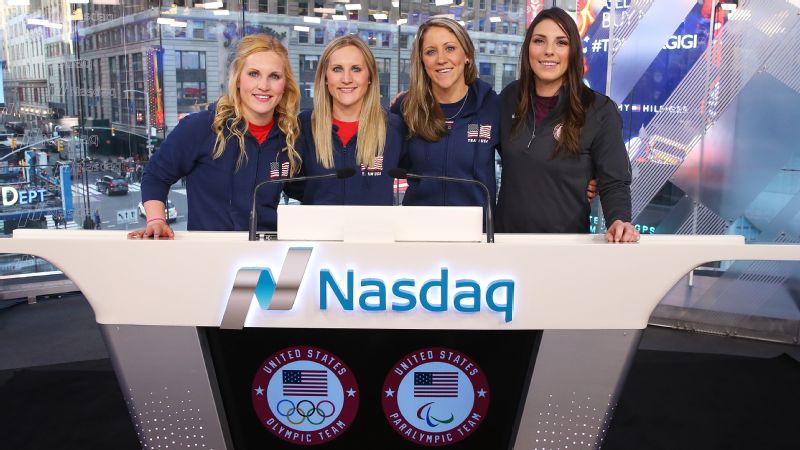
U.S. captain Meghan Duggan and her women’s national hockey teammates plan to sit out of the world championships, which are set to begin on March 31 in Plymouth, Michigan.
The U.S. women’s national hockey team said Wednesday that it will not participate in the IIHF World Championship beginning on March 31 in Plymouth, Michigan, citing more than a year of stalled negotiations with USA Hockey to secure what players consider fair wages and support.
The reigning world champions were set to arrive at training camp on March 21. Players said they believe meaningful progress was not being made in the negotiations and, as a result, informed USA Hockey on Wednesday that unless that happens, they will not report to Michigan.
“We are asking for a living wage and for USA Hockey to fully support its programs for women and girls and stop treating us like an afterthought,” said captain Meghan Duggan. “We have represented our country with dignity and deserve to be treated with fairness and respect.”
USA Hockey did not immediately respond to a request for comment.
The U.S. has won gold in six of the past eight world championships and has medaled in every Olympics, including winning gold in 1998.
The women, who are being represented in their negotiations by John B. Langel and Dee Spagnuolo of the law firm of Ballard Spahr, are seeking a contract with USA Hockey that includes what the players feel is appropriate compensation. Most of the players’ compensation outside of the Olympic period comes from the U.S. Olympic Committee.
“We are fortunate to have strong pioneers who have changed the landscape of their sport. Figures such as Billie Jean King or teams like U.S. women’s soccer have built a foundation not only for hope, but for action. As leaders in the sport of hockey, we are asking for equitable support and encouragement for participation for women,” said player Hilary Knight. “This is another important step for women in sports, but also for women at large and for generations to come in our fight for equal pay and support.”
In the past, USA Hockey has provided the players with $1,000 per month during the six-month Olympic residency period. According to the players, USA Hockey pays virtually nothing during the remainder of the four-year period, despite its expectation that in each of the non-Olympic years, the players train full-time and compete throughout the year.
“It is a full-time job and to not get paid is a financial burden and stress on players obviously. That is the conversation my husband and I are having right now,” said player Jocelyne Lamoureux-Davidson. “Is playing going to be more stress than we can handle? Sadly it becomes a decision between chasing your dream or giving in to the reality of the financial burden.”
The Ted Stevens Olympic and Amateur Sports Act requires national governing sports bodies to “provide equitable support and encouragement for participation by women where separate programs for male and female athletes are conducted on a national basis,” as is the case in hockey. According to the players, USA Hockey spends approximately $3.5 million annually to support a schedule of more than 60 games a season for boys participating in its national team development program. There are no comparable development opportunities for girls.
“It’s hard to believe that, in 2017, we still have to fight so hard for basic equitable support,” said assistant captain Monique Lamoureux-Morando. “But when I think about the women who paved the way for our team — and when I see girls at rinks around the country who are dedicated to pursuing big dreams and look to us to lead by example — it’s well overdue for us to speak up about unfair treatment, even if it means sacrificing an opportunity to represent our country. We owe the next generation more than that. We owe it to ourselves to stand up for what is right.”
Information from espnW’s Julie Foudy was used in this report.





